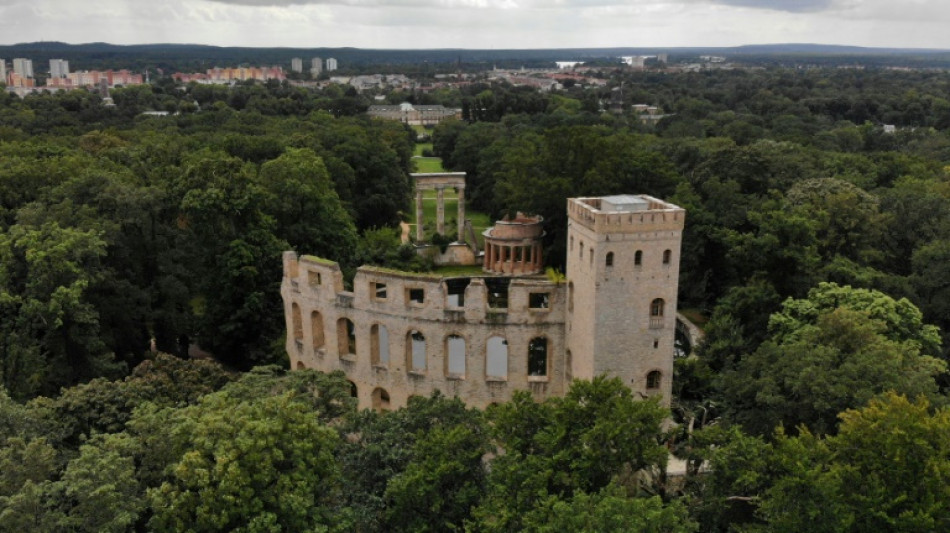
-
 US oil giants say it's early days on potential Venezuela boom
US oil giants say it's early days on potential Venezuela boom
-
Fela Kuti to be first African to get Grammys Lifetime Achievement Award

-
 Trump says Iran wants deal, US 'armada' larger than in Venezuela raid
Trump says Iran wants deal, US 'armada' larger than in Venezuela raid
-
US Justice Dept releases new batch of documents, images, videos from Epstein files

-
 Four memorable showdowns between Alcaraz and Djokovic
Four memorable showdowns between Alcaraz and Djokovic
-
Russian figure skating prodigy Valieva set for comeback -- but not at Olympics

-
 Barcelona midfielder Lopez agrees contract extension
Barcelona midfielder Lopez agrees contract extension
-
Djokovic says 'keep writing me off' after beating Sinner in late-nighter

-
 US Justice Dept releasing new batch of Epstein files
US Justice Dept releasing new batch of Epstein files
-
South Africa and Israel expel envoys in deepening feud

-
 French eyewear maker in spotlight after presidential showing
French eyewear maker in spotlight after presidential showing
-
Olympic dream 'not over', Vonn says after crash

-
 Brazil's Lula discharged after cataract surgery
Brazil's Lula discharged after cataract surgery
-
US Senate races to limit shutdown fallout as Trump-backed deal stalls

-
 'He probably would've survived': Iran targeting hospitals in crackdown
'He probably would've survived': Iran targeting hospitals in crackdown
-
Djokovic stuns Sinner to set up Australian Open final with Alcaraz

-
 Mateta omitted from Palace squad to face Forest
Mateta omitted from Palace squad to face Forest
-
Djokovic 'pushed to the limit' in stunning late-night Sinner upset

-
 Tunisia's famed blue-and-white village threatened after record rains
Tunisia's famed blue-and-white village threatened after record rains
-
Top EU official voices 'shock' at Minneapolis violence

-
 Kremlin says agreed to halt strikes on Kyiv until Sunday
Kremlin says agreed to halt strikes on Kyiv until Sunday
-
Carrick calls for calm after flying start to Man Utd reign

-
 Djokovic to meet Alcaraz in Melbourne final after five-set marathon
Djokovic to meet Alcaraz in Melbourne final after five-set marathon
-
Italian officials to testify in trial over deadly migrant shipwreck

-
 Iran says defence capabilities 'never' up for negotiation
Iran says defence capabilities 'never' up for negotiation
-
UN appeals for more support for flood-hit Mozambicans

-
 Lijnders urges Man City to pile pressure on Arsenal in title race
Lijnders urges Man City to pile pressure on Arsenal in title race
-
Fulham sign Man City winger Oscar Bobb

-
 Strasbourg's Argentine striker Panichelli sets sights on PSG, World Cup
Strasbourg's Argentine striker Panichelli sets sights on PSG, World Cup
-
Jesus 'made love': Colombian president irks Christians with steamy claim

-
 IAEA board meets over Ukraine nuclear safety concerns
IAEA board meets over Ukraine nuclear safety concerns
-
Eurozone growth beats 2025 forecasts despite Trump woes

-
 Dutch PM-elect Jetten says not yet time to talk to Putin
Dutch PM-elect Jetten says not yet time to talk to Putin
-
Social media fuels surge in UK men seeking testosterone jabs

-
 Forest face Fenerbahce, Celtic draw Stuttgart in Europa League play-offs
Forest face Fenerbahce, Celtic draw Stuttgart in Europa League play-offs
-
US speed queen Vonn crashes at Crans-Montana, one week before Olympics

-
 Trump nominates former US Fed official as next central bank chief
Trump nominates former US Fed official as next central bank chief
-
New Dutch government pledges ongoing Ukraine support

-
 Newcastle still coping with fallout from Isak exit, says Howe
Newcastle still coping with fallout from Isak exit, says Howe
-
Chad, France eye economic cooperation as they reset strained ties

-
 Real Madrid to play Benfica, PSG face Monaco in Champions League play-offs
Real Madrid to play Benfica, PSG face Monaco in Champions League play-offs
-
Everton winger Grealish set to miss rest of season in World Cup blow

-
 Trump brands Minneapolis nurse killed by federal agents an 'agitator'
Trump brands Minneapolis nurse killed by federal agents an 'agitator'
-
Arteta focuses on the positives despite Arsenal stumble

-
 Fijian Drua sign France international back Vakatawa
Fijian Drua sign France international back Vakatawa
-
Kevin Warsh, a former Fed 'hawk' now in tune with Trump

-
 Zverev rails at Alcaraz timeout in 'one of the best battles ever'
Zverev rails at Alcaraz timeout in 'one of the best battles ever'
-
Turkey leads Iran diplomatic push as Trump softens strike threat

-
 Zelensky backs energy ceasefire, Russia bombs Ukraine despite Trump intervention
Zelensky backs energy ceasefire, Russia bombs Ukraine despite Trump intervention
-
'Superman' Li Ka-shing, Hong Kong billionaire behind Panama ports deal

| SCS | 0.12% | 16.14 | $ | |
| RBGPF | 1.65% | 83.78 | $ | |
| RYCEF | -2.69% | 16 | $ | |
| BCC | -0.98% | 79.39 | $ | |
| JRI | 0.27% | 12.99 | $ | |
| CMSC | -0.11% | 23.67 | $ | |
| BTI | 0.21% | 60.335 | $ | |
| GSK | 1.33% | 51.34 | $ | |
| NGG | -0.44% | 84.68 | $ | |
| RELX | -1.59% | 35.6 | $ | |
| RIO | -5.36% | 90.29 | $ | |
| BCE | 0.25% | 25.55 | $ | |
| VOD | -0.58% | 14.625 | $ | |
| AZN | 0.59% | 93.14 | $ | |
| CMSD | 0.06% | 24.075 | $ | |
| BP | -1.52% | 37.47 | $ |

German drought prompts rethink for ancient palace park trees
Climate change is taking a heavy toll on the ancient trees of Sanssouci, the sumptuous summer palace built in the 18th century as the Prussian answer to Versailles.
The sprawling grounds with their manicured gardens in Potsdam southwest of Berlin are surrounded by a park filled with soaring, centuries-old giants that are now feeling the bite of persistent droughts.
Forest manager Sven Hannemann, standing at the foot of an oak with a six-metre (20-foot) trunk circumference, gazed up at its canopy which once stretched over 500 square metres.
Now its sickly branches are only dotted with green. Hannemann gave the old giant another two years, "then it will be dead".
In its 600 years, the tree had withstood storms, frigid temperatures and two world wars, but the lack of rain in the last few years due to the climate crisis has sounded its death knell.
"In 2018 when it was very dry, it suffered a real shock like many woody plants here in the park," Hannemann told AFP.
"And since then it's actually been shrinking."
Sanssouci Park stretching across 300 hectares (around 740 acres) has been part of Potsdam's UNESCO World Heritage collection of stately homes and gardens since 1990.
Its palace draws more than 300,000 visitors each year.
The park, which counts some 26,000 trees, is now losing between 180 and 300 per year -- at least three times the number that died annually before severe weather in 2017-18, a spokesman for the Palaces and Parks of Potsdam and Berlin foundation said.
Although 2023 has been less dry than previous years, rainfall has proved insufficient to counteract past drought damage and around half of the trees are showing signs of distress, he said.
Beyond the lack of moisture, voracious insects have been feasting on the trees.
- 'Takes decades' -
Hannemann knelt at the foot of the dying oak and let sawdust trickle through his hand -- the work of capricorn and oak splendour beetles.
The insects have nibbled a veritable deluge of debris out of the growth layer between the sapwood and the bark, as evidenced by thumb-thick holes in the trunk.
"They eat the cambium and no tree can live without cambium," referring to the cell layer under the bark that is responsible for secondary growth, Hannemann said.
The dying giant trees leave gaping holes in the forest, which harm other trees because their trunks and the forest floor are exposed to the sun's radiation without protection.
Hannemann plucked a leaf from a beech shoot and demonstrated the protective reflex of deciduous trees.
"Then the beech leaf curls up -- so far, so smart," he said.
"What's not so smart about it is that the sun gets through to the thick inner branches which weren't used to it in the first place, and then the branches get a sunburn."
It's a vicious circle that Hannemann said impacts all tree species.
Dead oaks or beech trees can then at best only serve as habitats for bats, insects or mushrooms.
But if the trunks and branches are too rotten and pose a safety risk to park visitors, they must be felled.
Yet there is still hope for the gnarled inhabitants of historic parks such as Sanssouci, whose Rococo palace Prussian King Frederick the Great designed and built as a retreat during his reign from 1740 until 1786.
Gardeners at the historic sites are experimenting with heat-resistant tree species from the Mediterranean region with some promising results, Hannemann said.
His team in Potsdam is also relying on the power of evolution.
"We believe that native woody plants also adapt to some extent," he said.
For example, acorns from trees that are obviously less affected by drought get planted in the forest floor.
However, the newer, more robust trees will need time to grow the thick protective canopies needed for the ecosystem.
"That takes decades," Hannemann said.
P.Anderson--BTB




